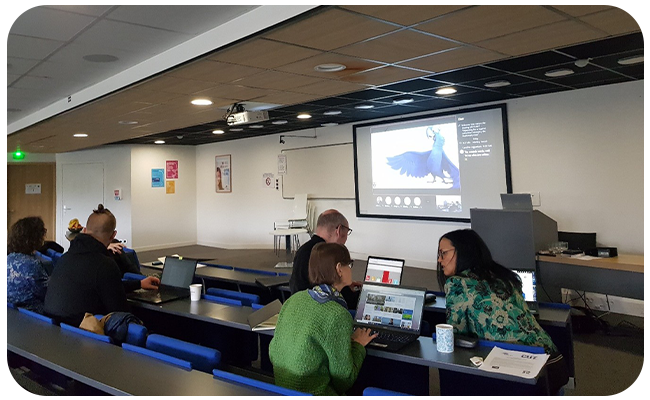As the global ecological crisis deepens - marked by accelerating biodiversity loss, climate change, and ecosystem collapse - it becomes increasingly clear that conventional management education is not only outdated, but insufficient. Rooted in anthropocentric values and the logic of limitless industrial growth, traditional business curricula often treat nature as a resource rather than a partner in prosperity. In response, we argue for a paradigm shift: the integration of eco-centric management learning through arts-based eco-pedagogy, as a radical and transformative response to today’s conservation challenges. This is not simply a curricular revision - it is a redefinition of what it means to educate responsibly in the Anthropocene. It echoes the spirit of Sustainable Development Goal 4, which calls for education systems that empower learners to engage with sustainability not just intellectually, but holistically.
Our work at Northumbria University’s Newcastle Business School critiques the dominant neoliberal models that underpin most management education frameworks, including those aligned with the UN Sustainable Development Goals. While these frameworks intend to foster environmental responsibility, they often do so within a business-as-usual mindset - failing to fully confront the ecological limits of economic systems. This results in superficial sustainability narratives that neither shift consciousness nor alter practices. To truly meet SDG 4’s vision, we must move beyond performative sustainability content and cultivate learning environments that foster critical consciousness, empathy, and systemic awareness.
Instead, we propose an eco-literate and arts-informed approach that places ecology - not economy - at the centre of business learning. By introducing students to biodiversity through poetry, storytelling, creative expression, and systems thinking, we help them develop not only cognitive understanding but emotional connection with the natural world. This shift is essential to instil the values and mindsets necessary for future business leaders to act in alignment with ecological resilience.
This approach aligns deeply with the Congress theme of Transitioning to Nature-Positive Economies and Societies. Rather than simply tweaking existing economic systems, our pedagogical model reimagines them - grounding management practice in planetary boundaries and ecological ethics. It also speaks to the need for Disruptive Innovation in Conservation, recognising that traditional educational tools are no longer sufficient in the face of systemic collapse. Eco-pedagogy opens space for creativity, empathy, and relational learning - key ingredients for a more regenerative future.
We also address Equity, as eco-literacy requires inclusive, pluralistic perspectives that respect indigenous knowledge systems, non-human agency, and intergenerational justice. Our educational model recognises that sustainability is not a technical challenge alone - it is a cultural and moral one. Quality education, as envisioned in SDG 4, must therefore be rooted in cultural humility, ecological integrity, and the capacity to imagine alternatives to the status quo.
Through case studies and classroom practice, we are beginning to build a new kind of business curriculum - one that empowers students to become conservation allies, ethical decision-makers, and ecological citizens. These future leaders will not only manage enterprises but co-create ecosystems of care - where business becomes a force for life, not loss.
As the IUCN World Conservation Congress 2025 convenes visionaries and changemakers from around the globe, we invite fellow educators, conservationists, and policy leaders to reflect: What if the next great conservation breakthrough doesn’t emerge from a lab or a boardroom, but from a classroom where ecology and imagination are equally valued?
